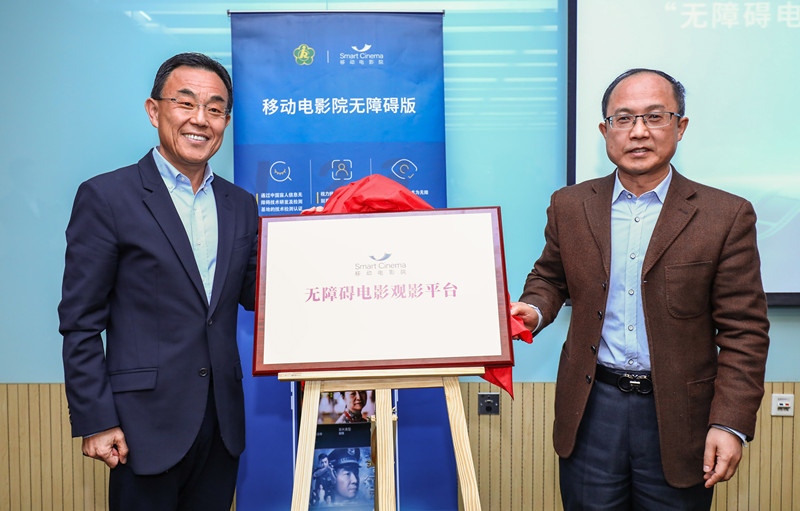China's new solution for blind and deaf to enjoy movies
- By Zhang Rui
 0 Comment(s)
0 Comment(s) Print
Print E-mail China.org.cn, December 21, 2019
E-mail China.org.cn, December 21, 2019

There's new solution for millions of people with vision or hearing loss in China to enjoy movies through mobile internet movie screening platform on their smart phones.
The country has more than 17 million visually impaired people and over 20 million people with hearing and language impairment, according to the China Disabled Persons' Federation.
At a seminar held in Beijing on Tuesday, Smart Cinema announced it can help them to "watch" the latest films if they download its app, a new venture by top film executive Jack Gao that can simultaneously screen some films still being shown in theaters.
It has been advertised as another form of online theater to collect money by selling tickets and the gross will be counted into any film's actual gross, thus being quite different from a video streaming site.
Gao, founding partner and CEO of Smart Cinema, explaining his new venture, said: "The most important function of Smart Cinema is that it is barrier-free, not just for the disabled people, but also for everyone who has any difficulty in going to actual theaters to watch movies. By using Smart Cinema, one can watch a film anywhere and anytime. This is a great breakthrough in the mobile internet era."
With China Association of the Blind's guidance and support, those with visual impairment can now log on the new version on their smart phones to enjoy barrier-free films after their IDs are verified by the system.
It is a form of film for people with visual and hearing difficulties to understand and appreciate, by adding appropriate commentary audio track and subtitles and sign language to ordinary versions of movies. In recent years, relevant institutions in China have produced hundreds of barrier-free films and provided free screening services for people with such disabilities.
Gao said the app hopes to use advanced mobile internet technology to turn the mobile phone into barrier-free film screening equipment, helping disabled people to fulfill their dreams of being immersed in the cinematic world just like anyone else.
Currently, there are a few barrier-free films available on Smart Cinema platform, however, the numbers will increase, according to a publicist of the company. Smart Cinema's barrier-free version will also allow access to the China Disabled Persons' Federation's big data system, thus providing more free service to the disabled people.
"We cannot know what the world of darkness looks like for the blind, and I hear that there are more disabled people out there of whom we are unaware. Through enjoying a movie together and helping them to do so, I feel we can still connect with their souls, and then I feel what we have been doing is worthwhile," he added.
Zhu Qingyi, special expert on information barrier-free technology of the China Disabled Persons' Federation, said Smart Cinema's new version can automatically detect the mobile phone system settings, and switch to the barrier-free viewing area for users who have turned on this mode, and that the system “fully considers many details in practical requirements’.
He is chief advisor for a newly founded barrier-free film screening technology center under Smart Cinema.
Xiang Zicheng, vice president of the China Disabled Persons' Federation, believed the launch of barrier-free Smart Cinema was a good example of using modern technology to serve the disabled; the federation would actively promote the work related to barrier-free films and improve the service for the disadvantaged to enrich their cultural life, and further promote the development of the cultural cause for them.
The seminar, themed on developing and promoting barrier-free films and jointly held by China Association of the Blind and China Disabled Persons' Federation, summarized the experience of the system’s development in China in recent years, and discussed the main problems involved for further development.
It also adopted the "Proposal on Supporting the Development of Barrier-free Films", calling on all sectors of society to care about and support the development, actively donate film rights, strengthen the standardization of barrier-free films, expand the service channels and continuously improve barrier-free films service scope and service effectiveness.






Go to Forum >>0 Comment(s)